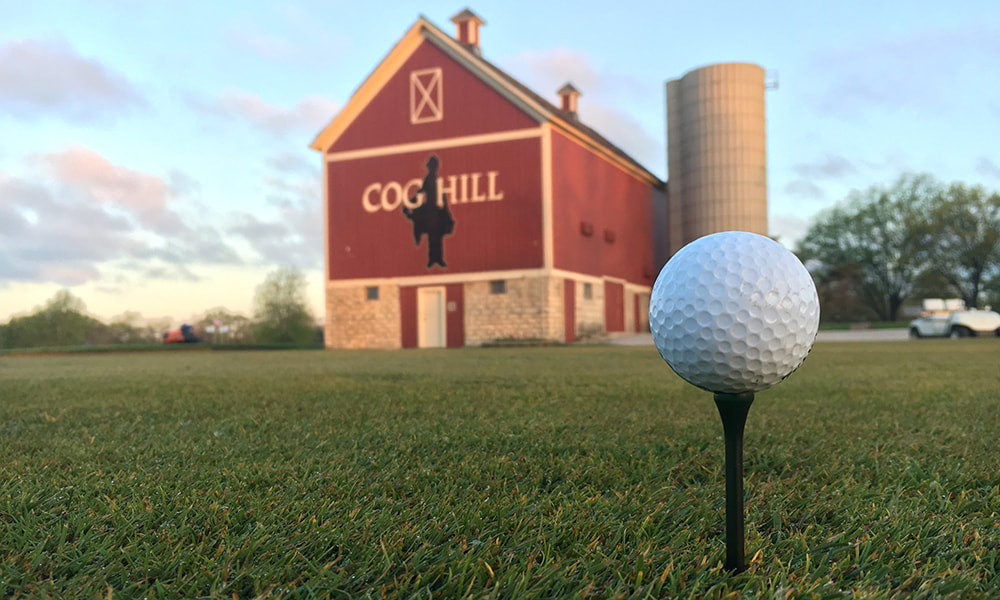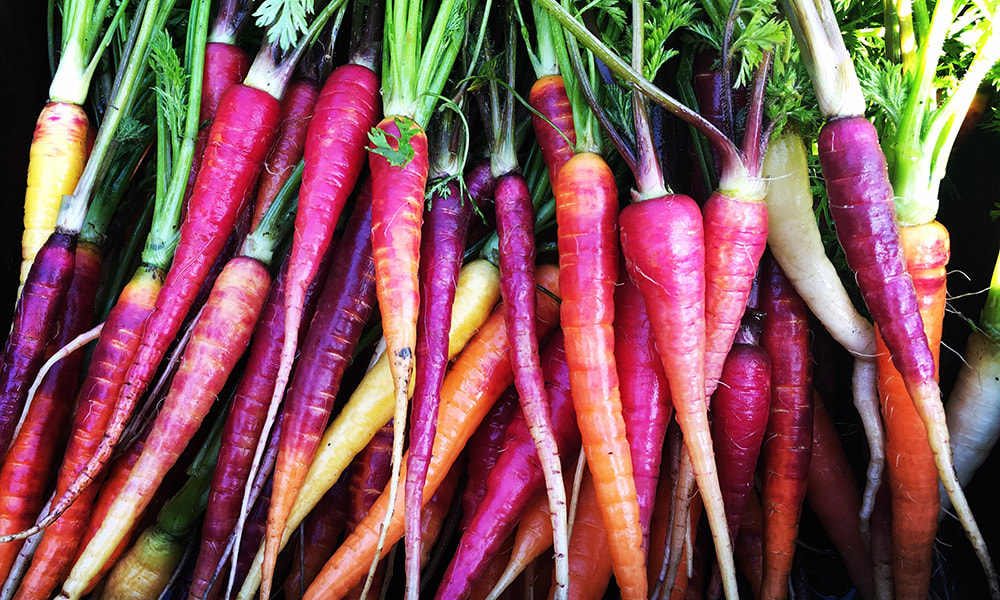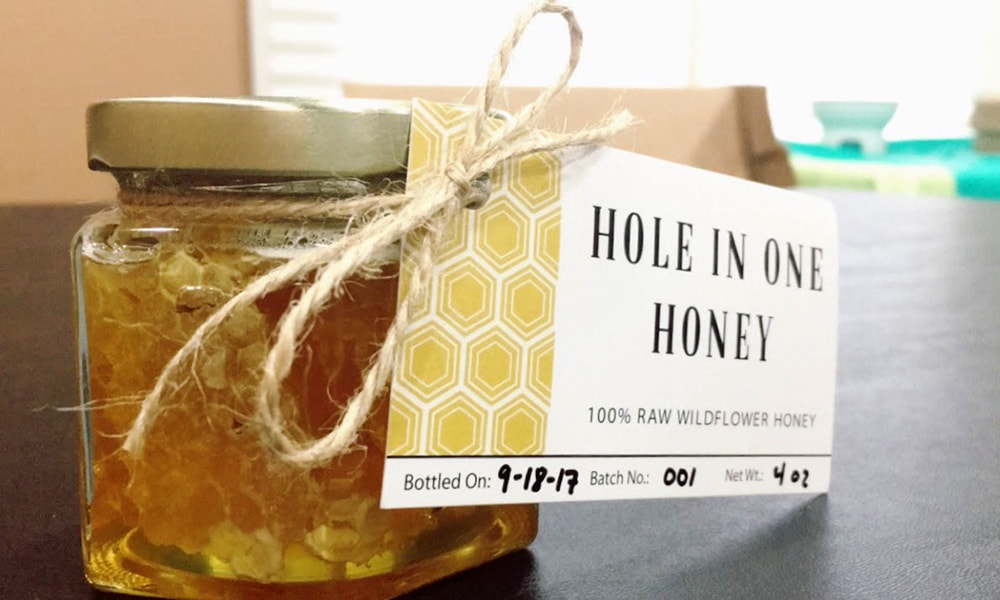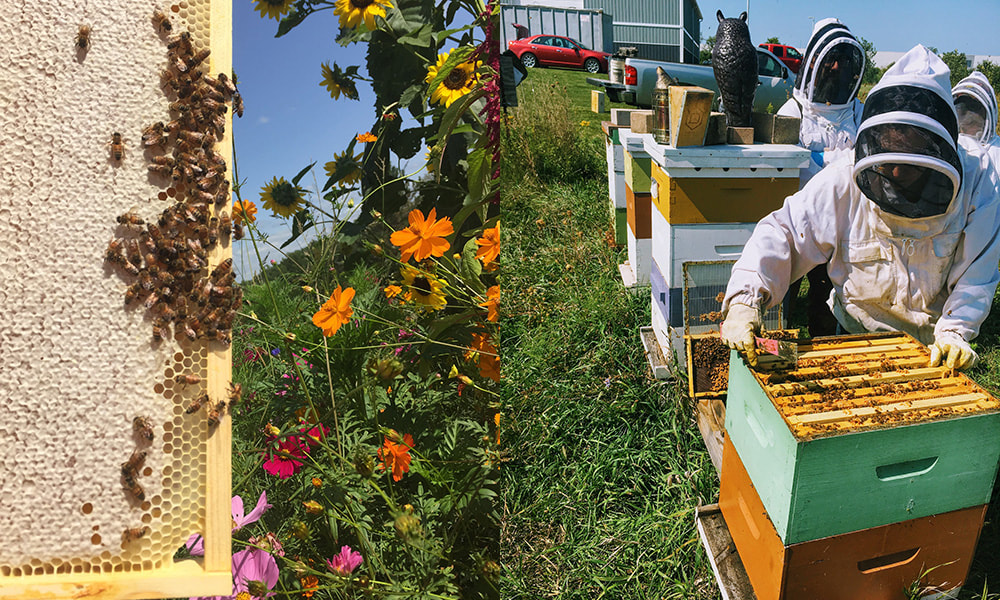|
Six years have passed since I last visited Cog Hill Golf and Country Club in Lemont, Illinois. At that time Executive Chef Ricardo Marquez and Co-Executive Chef Jose Alcantar were serving a wide array of culinary options that blended the local Chicago food scene with their Mexican heritage. One of their goals was to support the local community and to buy locally produced produce if the quality was of a high standard. I sensed back then that Marquez and Alcantar had much bigger visions for the future of the dining scene at Cog Hill especially with health and wellness becoming an important focus in the golf industry as an entirety. Fast forward six years, I discover a 2000 square foot sustainable farm and apiary that has been built adjacent to the third hole of the Ravines course which in its first year supplied 2000 lbs. of produce to the kitchen, much to the delight of Marquez and Alcantar and to the hungry golfers! Much of this credit goes to Angelica Carmen, Sustainability Specialist and Chris Flick, Director of Grounds Operations who have become an on and off course sustainability tag team. ~ Diana DeLucia GK: Angelica, when did the vision for creating a sustainable farm at Cog Hill begin? Angelica: I was hired as Sustainability Specialist in January 2017 with the intention of working on developing environmental programs for Cog Hill outside of on-course management. I was coming from recent internships working on restaurant rooftop farms in Chicago like "Uncommon Ground" www.uncommonground.com as well as Loyola University Chicago’s Urban Agriculture program www.luc.edu/sustainability/initiatives/urban-agriculture/index.shtml working with their greenhouse, aquaponics systems, farmers market, etc. My heart is in the food system and it’s something that everyone can connect with. With sustainability boasting such a wide array of topics, Chris Flick and I discussed a lot of different projects to pursue. Developing a sustainable farm for the Club made the most sense in our opinion given my experience, our facility, and how many different facets of sustainability could be incorporated. Essentially, it was the perfect starting point for us towards “greening” Cog Hill with features like beekeeping, native pollinator spaces, composting, low-input local food production, and creating green space where there was otherwise gravel and weeds. Equally important is our goal of showing not just the creative innovation that can take place on a golf course, but also what everyday people can do at home to make a difference. GK: How long did it take to build the farm and when were the first crops available? What were they? Angelica: The farm was built in the Spring of 2017 in the lot that once held parking for the BMW Championship. When I first began working on the farm, we had to start entirely from scratch as the lot itself had gone unused for some time. Physical work began as early as February, prepping out spaces for our solar greenhouse, storage shed, apiary, etc. Thankfully, our Grounds Crew is very talented and got us up and running in about one to two months with those facilities. The actual farm took another three months before we finally put crops in the ground, as we start everything from seed. The space, in general, is constantly evolving with new features and manicuring old ones. We have 17 raised beds covering roughly 2,000 square feet of growing space, all constructed from concrete cinder blocks. Within that space, we produced just over 2,000 lbs. of heirloom vegetables, herbs, and edible flowers from May-November of our first season. Our first crops available were quick-growing root vegetables and spring greens in late May that the kitchen was able to use in our seasonal salad bar. GK: Where did the name Fairway Farms originate? Angelica: After a lot of brainstorming, I pitched the name Fairway Farms & Apiary to Chris in July 2017. The name comes from the fact that the farm is located alongside the third hole on the Ravines Course and I found it extremely important to tie everything we do to the golf theme given how unique it is to produce food on a golf course. Additionally, our raw Wildflower Honey is named Hole in One Honey, and our locally brewed Cog Hill beer is named DubsDelight after our championship course Dubsdread. GK: How involved was Chef Marquez and Alcantar in the creation of the farm? Angelica: Marquez and Alcantar assisted in the crop planning stage of the farm operation as his team would be the recipients of everything we produced. Our first year was exciting because we all knew it was very experimental in its infant stage, so everyone rolled with the punches very well. My goal for the farm was to blend unique varieties of standard crops to compliment dishes we were already serving on the menu that would punctuate these recipes with exceptional colors, flavors, and nutritional content to showcase the limitless options you have with food. Our first year was about understanding the land we were growing on, how much we could produce, and how those things blended with the kitchen’s routine. Now that we know our output capability, this year we’re working hard to ensure zero waste of everything grown by tailoring our crop list to what worked best last season for the chefs. Last season, Chef Ricardo estimated his team used about 85% of what was delivered by my team, with the rest of it returned to the compost bin for use back in the garden. GK: Chris, tell us more information about the on-course sustainability program from your perspective? Chris: On-course sustainability has been focused on finding solutions to maintain premium standards while reducing inputs regarding to synthetic pesticides, fertilizers, and water usage. We've thoroughly investigated many products and have currently developed programs utilizing the Organic Materials Review Institute www.omri.org (OMRI) and natural bio stimulant materials such as seaweed extracts, vermicompost teas, nutrient-mining products, and mineral oils to suppress disease and combat abiotic and biotic stresses. We have reduced our usage of synthetic pesticides by nearly 60 percent on most of the property and we have drastically limited our use of granular fertilizers to reduce the potential for leaching. Water inputs have been cut to nearly half. In addition, we have transitioned nearly 100 acres of maintained rough areas to naturalized areas to enhance wildlife habitat and to reduce our usage of fossil fuels to maintain the areas. Agronomics aside, we are currently in the process of streamlining a property-wide recycling program. We also utilize recycled concrete aggregate to build cart paths on the golf course. GK: Tell me about your experience working with Angelica with the off-course program. Chris: My experience working with Angelica has been exciting and refreshing, to say the least. What she's been able to do in a short amount of time regarding the implementation of ideas and the labor to construct the farm, apiary, and compost bins have been remarkable. Her vision for herself and sustainability venture we are undertaking far exceeds any vision that I had prior to her arrival. She has opened the eyes of so many people on staff and in the community and it's finally starting to attract positive attention. I feel like she's really getting traction and her ideas are starting to take flight, which I find extremely rewarding for us as a department. It's exciting that she can really take sustainability on these golf courses to a level that not many people could envision or expect. The quality of her produce including the vegetables, honey and beer, is an absolute reflection of her work ethic, dedication, and passion for what she does. GK: Angelica, tell us about the Cook County Farm Bureau's Farm Dinner that you are holding at the Farm. Angelica: The Farm Dinner is slated for Thursday, August 16th in the evening. Though we are still working on the details, there will be online ticket sales with reservations required. The dinner will take place on the farm grounds where guests will be seated among the farm beds and trellises of tomatoes and will include a quick cocktail hour tour of the site.
1 Comment
|





